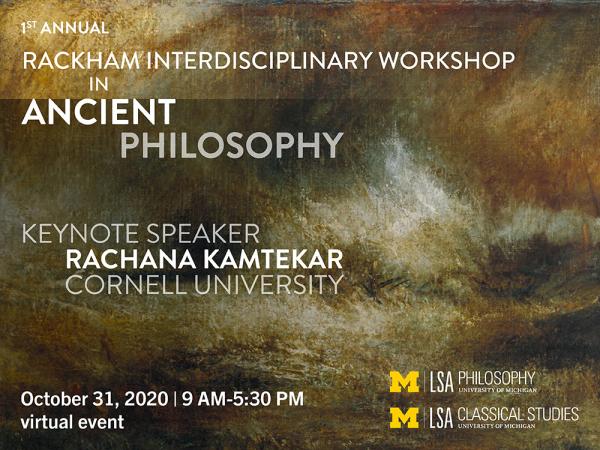
Saturday, October 31, 2020
9:00 AM-5:30 PM
Virtual
A passcode is required to attend this virtual event. Please contact glzhou@umich.edu to request the passcode.
Zoom Meeting Link: https://umich.zoom.us/j/98177255228
Meeting ID: 981 7725 5228
SCHEDULE
Morning Session 1. Chair: Matteo Milesi, University of Michigan
9-9:45 am
Speaker: Edoardo Benati, Scuola Normale Superiore di Pisa, ‘Speusippus on the Epistemic Requirements for Diairesis: Scientific Sense Perception as a Knowledge-Yielding Principle’
Commentator: Andrew Mayo, University of Michigan
9:45-10:30 am
Speaker: Elena Comay del Junco, University of Connecticut, ‘Aristotle’s Erotic Theology’
Commentator: Sean Costello, University of Michigan
15-min Break
Morning Session 2. Chair: Lianghua (Glenn) Zhou, University of Michigan
10:45-11:30 am
Speaker: Ian McCready-Flora, University of Virginia, ‘Of Measures and Men: Why Protagoras Really Matters to Aristotle’
Commentator: Adam Waggoner, University of Michigan
11:30-12:15 pm
Speaker: Taylor Barinka, University of Toronto, ‘Law and Temperance in Plato’s Gorgias’
Commentator: Gonzalo Gamarra Jordan, University of Notre Dame
Lunch
Afternoon Session 1. Chair: Justin Barney, University of Michigan
2:15-3 pm
Speaker: Cara Cummings, John Hopkins University, ‘The Contemptuous Attitude of Aristotle’s Megalopsuchos’
Commentator: Van Tu, Bowdoin College
3-3:45 pm
Speaker: Joshua Mendelsohn, Loyola University Chicago, ‘Aristotle on Knowledge of Particulars: Metaphysics M.10 and the Posterior Analytics’
Commentator: Emily Katz, Michigan State University
15-min Break
Afternoon Session 2. Chair: Adam Waggoner, University of Michigan
4-5:30 pm
KEYNOTE SPEAKER: Rachana Kamtekar, Cornell University
Feelings of Necessity: Compulsion in Aristotle’s Ethics
Abstract: Students of Aristotle’s Nicomachean Ethics will know that Aristotle judges actions done under duress (our term, not his) voluntary even if the agent’s only alternatives were terrible (e.g. the captain of a storm-tossed ship must dump his cargo or lose his ship). In the NE he argues for this position on the grounds that since the agent chose the alternative he did, the principle of his action was not external to him as it always is in a case of force (1110a5-29). How does Aristotle come to this uncompromising position? An answer should explain why he holds the opposite view in the Eudemian Ethics, where he judges such actions compelled and involuntary (1225a9-19). I argue that the answer lies in the changing role played by the apparent good across Aristotle’s ethical treatises.
Zoom Meeting Link: https://umich.zoom.us/j/98177255228
Meeting ID: 981 7725 5228
SCHEDULE
Morning Session 1. Chair: Matteo Milesi, University of Michigan
9-9:45 am
Speaker: Edoardo Benati, Scuola Normale Superiore di Pisa, ‘Speusippus on the Epistemic Requirements for Diairesis: Scientific Sense Perception as a Knowledge-Yielding Principle’
Commentator: Andrew Mayo, University of Michigan
9:45-10:30 am
Speaker: Elena Comay del Junco, University of Connecticut, ‘Aristotle’s Erotic Theology’
Commentator: Sean Costello, University of Michigan
15-min Break
Morning Session 2. Chair: Lianghua (Glenn) Zhou, University of Michigan
10:45-11:30 am
Speaker: Ian McCready-Flora, University of Virginia, ‘Of Measures and Men: Why Protagoras Really Matters to Aristotle’
Commentator: Adam Waggoner, University of Michigan
11:30-12:15 pm
Speaker: Taylor Barinka, University of Toronto, ‘Law and Temperance in Plato’s Gorgias’
Commentator: Gonzalo Gamarra Jordan, University of Notre Dame
Lunch
Afternoon Session 1. Chair: Justin Barney, University of Michigan
2:15-3 pm
Speaker: Cara Cummings, John Hopkins University, ‘The Contemptuous Attitude of Aristotle’s Megalopsuchos’
Commentator: Van Tu, Bowdoin College
3-3:45 pm
Speaker: Joshua Mendelsohn, Loyola University Chicago, ‘Aristotle on Knowledge of Particulars: Metaphysics M.10 and the Posterior Analytics’
Commentator: Emily Katz, Michigan State University
15-min Break
Afternoon Session 2. Chair: Adam Waggoner, University of Michigan
4-5:30 pm
KEYNOTE SPEAKER: Rachana Kamtekar, Cornell University
Feelings of Necessity: Compulsion in Aristotle’s Ethics
Abstract: Students of Aristotle’s Nicomachean Ethics will know that Aristotle judges actions done under duress (our term, not his) voluntary even if the agent’s only alternatives were terrible (e.g. the captain of a storm-tossed ship must dump his cargo or lose his ship). In the NE he argues for this position on the grounds that since the agent chose the alternative he did, the principle of his action was not external to him as it always is in a case of force (1110a5-29). How does Aristotle come to this uncompromising position? An answer should explain why he holds the opposite view in the Eudemian Ethics, where he judges such actions compelled and involuntary (1225a9-19). I argue that the answer lies in the changing role played by the apparent good across Aristotle’s ethical treatises.
| Building: | Off Campus Location |
|---|---|
| Location: | https://umich.zoom.us/j/98177255228 |
| Event Link: | |
| Event Type: | Livestream / Virtual |
| Tags: | Classical Studies, Philosophy |
| Source: | Happening @ Michigan from Department of Philosophy |

